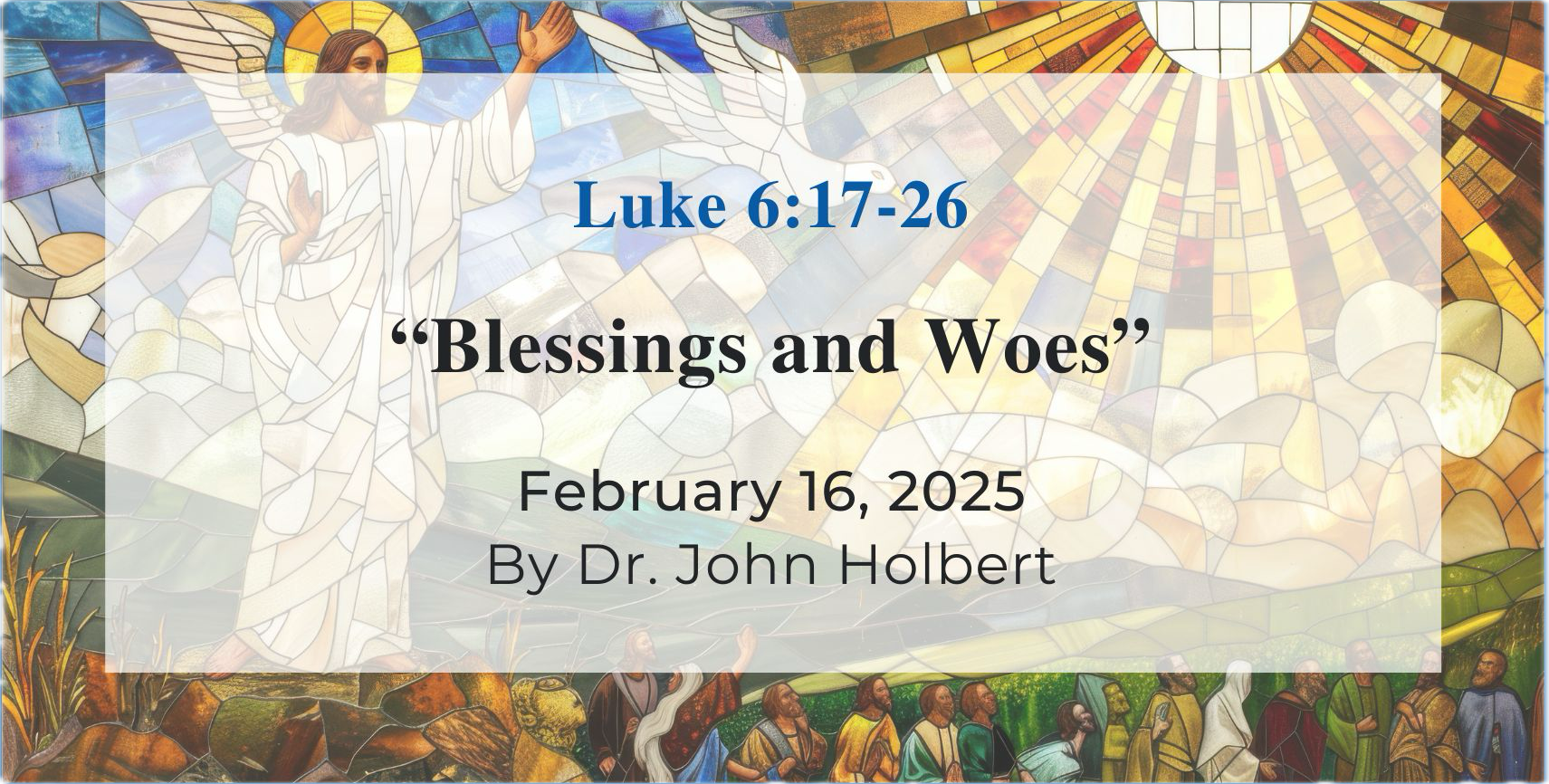Blessings and Woes - Reflections on Luke 6:17-26 for Epiphany 6, Year C
by John C. Holbert on Wednesday, January 15, 2025

As I have stated before in my reflections on the gospel passages, it is crucial to recognize the audience to which each writer speaks. This is particularly true when comparing the work of Matthew and Luke, who closely pattern their writing on one another, but because of the different audiences they address, the shape of their productions are quite distinct. This can be exemplified by a brief comparison of the “sermon on the mount” from Matthew and the “sermon on the plain” from Luke. Both are uttered directly after the call of the disciples from their fishing lives into a new life of itinerant ministry with Jesus, but the goals of the two sermons may be sharply contrasted.
In Matthew the sermon is a significant 111 verses long, with nine rich blessings without corresponding woes. Matthew is clearly addressing a Jewish readership, speaking directly to the developing rabbinic tradition as it confronts the emerging early Christian communities. It is obvious that the coming split between Christians and Jews is immanent, and Matthew is intent on demonstrating to his Jewish listeners that his story of Jesus of Nazareth is in multiple ways a continuation and a fulfillment of the story of the Hebrew Bible. Matthew’s account of the sermon on the mount is a certain reflection on the most famous tale of Judaism, the giving of the Torah to Moses on Sinai, and his giving of that Torah to the people of God. Exodus 19:20-23:33 and Deuteronomy 4:44-26:19 is mirrored by Jesus’ ascent of the mountain in order to teach the crowds along with his disciples. Matthew focuses the attention of his hearers on “the Law and the Prophets” and their interpretation, as any good Jew would be concerned with.
None of this is the concern of Luke. His audience is plainly Gentiles, hence the near absence of Jewish content from his sermon which comprises only 29 verses, barely 1/4 of the expansive sermon of Matthew. Indeed, Luke’s sermon on the plain, the flat place, is spare in the extreme, with an ethical emphasis fully conducive to his Gentile hearers and listeners. The differences are made obvious in the very first beatitude: “Blessed are the poor in spirit,” says Matthew, focusing the reader’s attention on an individual’s spiritual attitudes. Subsequently, as later generations have appropriated these wonderful sayings for their communities, they have welcomed the individual spirituality of Matthew’s Jesus.
Not so in Luke! “Blessed are you poor,” he says, meaning precisely what he says: the poor, those without the means for easy survival in 1st century Judea, are surprisingly blessed, makaria in Greek, which can mean “happy,” but the nuance suggests a righteous condition before God. The poor are uniquely blessed by God, says Luke, suggesting that their poverty is no impediment to God’s favor. And in the contrasting woe, Luke says the rich who in reality are secure and powerful in their wealth, are rejected by that same God; it is again surprisingly the poor who are said to possess the kingdom of God, not the rich who already have their reward, says Luke.
Luke makes a broader point by these reversals of fortune, rich and poor, hungry and filled, mourners and glad ones; God is in the business of turning human realities upside down. As one can see in Mary’s grand Magnificat (Luke 1:46-55), that is God’s most recognizable work, making the world ever new and wonderful by shifting the focus of the world to those the world tends to forget. Just as the Son of Man (the human one) will be shown to be rejected by the leaders of the people, yet he is known by his followers as God’s “beloved Son,” so are his followers, when rejected because of him, to rejoice, “for their reward is great in heaven” (6:23). As we can now begin to see, the beatitudes and woes are examples of this pattern of reversal that Luke will display throughout his gospel and on into his book of the Acts of the Apostles. God is ever at work in this prophetic Jesus, altering values, challenging perceptions: the mighty are cast down, while the lowly are lifted up.
Little wonder that when Luke adds his more direct ethical admonitions for those who would join Jesus in the work of God’s kingdom, some of those admonitions are among the most peculiar and challenging of any to be found in Jesus’s teaching: “Love your enemies,” he says, as odd a command as one is ever likely to hear. “Pray for those who abuse you,” he adds. Really!? Just what is this kingdom about, and how can anyone ever enter it? Next week, we will examine those jagged statements more closely in the attempt to discover just what it may mean for us to call ourselves Christians. More reversals of expectations may be in the offing!
